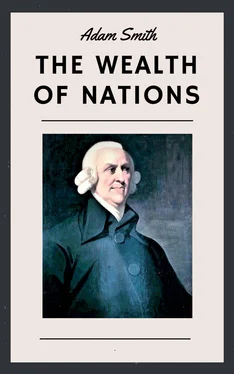The demand for the precious stones arises altogether from their beauty. They are of no use but as ornaments; and the merit of their beauty is greatly enhanced by their scarcity, or by the difficulty and expense of getting them from the mine. Wages and profit accordingly make up, upon most occasions, almost the whole of the high price. Rent comes in but for a very small share, frequently for no share; and the most fertile mines only afford any considerable rent. When Tavernier, a jeweller, visited the diamond mines of Golconda and Visiapour, he was informed that the sovereign of the country, for whose benefit they were wrought, had ordered all of them to be shut up except those which yielded the largest and finest stones. The other, it seems, were to the proprietor not worth the working.
As the prices, both of the precious metals and of the precious stones, is regulated all over the world by their price at the most fertile mine in it, the rent which a mine of either can afford to its proprietor is in proportion, not to its absolute, but to what may be called its relative fertility, or to its superiority over other mines of the same kind. If new mines were discovered, as much superior to those of Potosi, as they were superior to those of Europe, the value of silver might be so much degraded as to render even the mines of Potosi not worth the working. Before the discovery of the Spanish West Indies, the most fertile mines in Europe may have afforded as great a rent to their proprietors as the richest mines in Peru do at present. Though the quantity of silver was much less, it might have exchanged for an equal quantity of other goods, and the proprietor's share might have enabled him to purchase or command an equal quantity either of labour or of commodities.
The value, both of the produce and of the rent, the real revenue which they afforded, both to the public and to the proprietor, might have been the same.
The most abundant mines, either of the precious metals, or of the precious stones, could add little to the wealth of the world. A produce, of which the value is principally derived from its scarcity, is necessarily degraded by its abundance. A service of plate, and the other frivolous ornaments of dress and furniture, could be purchased for a smaller quantity of commodities; and in this would consist the sole advantage which the world could derive from that abundance.
It is otherwise in estates above ground. The value, both of their produce and of their rent, is in proportion to their absolute, and not to their relative fertility. The land which produces a certain quantity of food, clothes, and lodging, can always feed, clothe, and lodge, a certain number of people; and whatever may be the proportion of the landlord, it will always give him a proportionable command of the labour of those people, and of the commodities with which that labour can supply him. The value of the most barren land is not diminished by the neighbourhood of the most fertile. On the contrary, it is generally increased by it. The great number of people maintained by the fertile lands afford a market to many parts of the produce of the barren, which they could never have found among those whom their own produce could maintain.
Whatever increases the fertility of land in producing food, increases not only the value of the lands upon which the improvement is bestowed, but contributes likewise to increase that of many other lands, by creating a new demand for their produce. That abundance of food, of which, in consequence of the improvement of land, many people have the disposal beyond what they themselves can consume, is the great cause of the demand, both for the precious metals and the precious stones, as well as for every other conveniency and ornament of dress, lodging, household furniture, and equipage. Food not only constitutes the principal part of the riches of the world, but it is the abundance of food which gives the principal part of their value to many other sorts of riches. The poor inhabitants of Cuba and St. Domingo, when they were first discovered by the Spaniards, used to wear little bits of gold as ornaments in their hair and other parts of their dress. They seemed to value them as we would do any little pebbles of somewhat more than ordinary beauty, and to consider them as just worth the picking up, but not worth the refusing to any body who asked them, They gave them to their new guests at the first request, without seeming to think that they had made them any very valuable present. They were astonished to observe the rage of the Spaniards to obtain them; and had no notion that there could anywhere be a country in which many people had the disposal of so great a superfluity of food; so scanty always among themselves, that, for a very small quantity of those glittering baubles, they would willingly give as much as might maintain a whole family for many years. Could they have been made to understand this, the passion of the Spaniards would not have surprised them.
Конец ознакомительного фрагмента.
Текст предоставлен ООО «ЛитРес».
Прочитайте эту книгу целиком, купив полную легальную версию на ЛитРес.
Безопасно оплатить книгу можно банковской картой Visa, MasterCard, Maestro, со счета мобильного телефона, с платежного терминала, в салоне МТС или Связной, через PayPal, WebMoney, Яндекс.Деньги, QIWI Кошелек, бонусными картами или другим удобным Вам способом.












